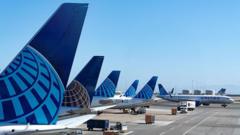The Trump administration has initiated an investigation focusing on the import of commercial aircraft, jet engines, and associated components, potentially paving the way for new tariffs in response to national security concerns. Begun on May 1, the inquiry was announced through a federal notice, with Commerce Secretary Howard Lutnick at the helm. This development follows previous tariff actions taken by President Trump, including those on aluminum and steel, alongside investigations into semiconductors and pharmaceuticals.
As part of this comprehensive investigation, the Commerce Department will gather industry feedback regarding domestic demand for aircraft and parts, the role of international suppliers in the market, and whether foreign governments are favoring these businesses. The imposition of tariffs on imports could adversely impact the aerospace sector, notorious for generating significant trade surpluses while depending on a vast array of specialized global suppliers. Projections estimate the industry will export around $125 billion this year, making it one of America’s top export industries.
Eric Fanning, President of the Aerospace Industries Association, highlighted the importance of the aerospace sector as a cornerstone of economic growth and innovation. He expressed hope for productive discussions with the Commerce Department to bolster domestic supply chains without compromising the established trade framework that has positioned the U.S. as a leader in the aerospace industry.
Boeing, well-known for its commercial aircraft, reported that while the tariffs implemented by Trump have had minor immediate effects, they are concerned about the long-term impact on their supplier networks. CEO Kelly Ortberg mentioned that Boeing currently absorbs a 10 percent tariff on specific components imported from Japan and Italy, projecting cost recovery upon selling the final aircraft. Meanwhile, other industry players like RTX and GE Aerospace anticipate the tariffs could result in significant financial burdens totaling nearly $1.35 billion this year.
Historically, countries have utilized tariffs and subsidies to shield and promote their aviation sectors. A notable example includes the lengthy dispute between the U.S. and the European Union over alleged unfair subsidies granted to Boeing and Airbus, which concluded in 2021 with an agreement to collaborate against China’s rising influence in key industrial sectors.
Niraj Chokshi covers the aviation and transportation sectors for the publication, detailing the ongoing dynamics within this critical industry.
As part of this comprehensive investigation, the Commerce Department will gather industry feedback regarding domestic demand for aircraft and parts, the role of international suppliers in the market, and whether foreign governments are favoring these businesses. The imposition of tariffs on imports could adversely impact the aerospace sector, notorious for generating significant trade surpluses while depending on a vast array of specialized global suppliers. Projections estimate the industry will export around $125 billion this year, making it one of America’s top export industries.
Eric Fanning, President of the Aerospace Industries Association, highlighted the importance of the aerospace sector as a cornerstone of economic growth and innovation. He expressed hope for productive discussions with the Commerce Department to bolster domestic supply chains without compromising the established trade framework that has positioned the U.S. as a leader in the aerospace industry.
Boeing, well-known for its commercial aircraft, reported that while the tariffs implemented by Trump have had minor immediate effects, they are concerned about the long-term impact on their supplier networks. CEO Kelly Ortberg mentioned that Boeing currently absorbs a 10 percent tariff on specific components imported from Japan and Italy, projecting cost recovery upon selling the final aircraft. Meanwhile, other industry players like RTX and GE Aerospace anticipate the tariffs could result in significant financial burdens totaling nearly $1.35 billion this year.
Historically, countries have utilized tariffs and subsidies to shield and promote their aviation sectors. A notable example includes the lengthy dispute between the U.S. and the European Union over alleged unfair subsidies granted to Boeing and Airbus, which concluded in 2021 with an agreement to collaborate against China’s rising influence in key industrial sectors.
Niraj Chokshi covers the aviation and transportation sectors for the publication, detailing the ongoing dynamics within this critical industry.



















